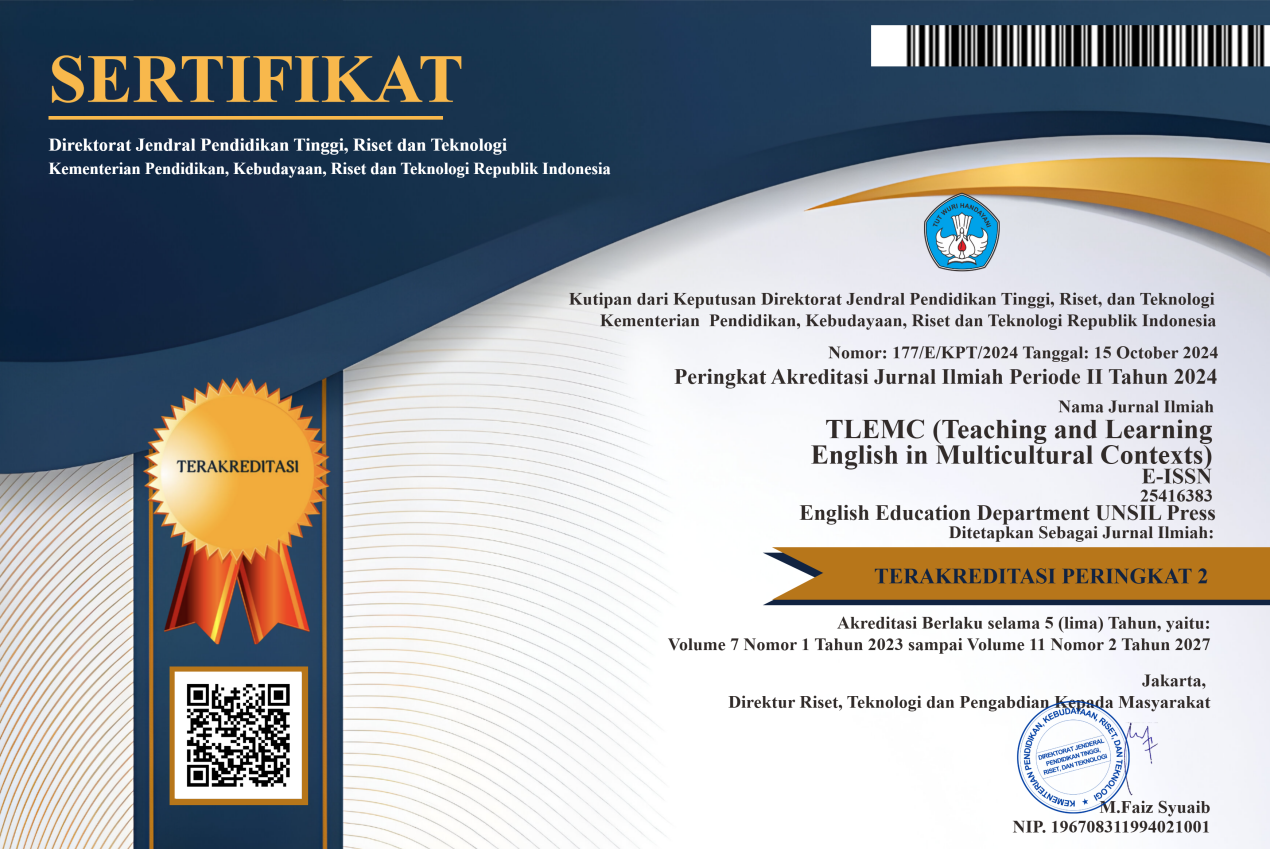FACEBOOK AS A MEDIATION OF PEER ASSESSMENT: EXPLORING CHALLENGES AND BENEFITS IN AN EFL SPEAKING CLASSROOM SETTING
Abstract
The purpose of this study was to address students’ perceptions about integrating Facebook as the mediation of peer assessment in EFL Speaking Classroom. The participants of this study consist of four students in the fourth semester pursuing English Education major in an Indonesian university. The data was collected by semi-structured interview and then the data were analyzed qualitatively, and interpretively by using thematic analysis. The result indicates four emerging themes about the students’ perception on using FB as the mediation of peer assessment; challenges encountered by the students during FB-mediated peer assessment, the importance of being an autonomous learner, FB as a platform to build speaking learning motivation, and FB as a platform to build speaking learning confidence. This study provided language instructors with insights into the adoption of Facebook in an EFL context and supported them with better design tasks on FB.
Full Text:
PDFReferences
Chandra, V., & Watters, J. J. (2012). Re-thinking physics teaching with web-based learning. Computers and Education, 58(1), 631–640. https://doi.org/10.1016/j.compedu.2011.09.010
Cook, D. (2007). Web-based learning: pros, cons. Medical Education, 7(1), 37–42. https://doi.org/10.7861/clinmedicine.7-1-37
Deejring, K. (2014). The design of web-based learning model using collaborative learning techniques and a scaffolding system to enhance learners’ competency in higher education. Procedia - Social and Behavioral Sciences, 116, 436–441. https://doi.org/10.1016/j.sbspro.2014.01.236
Dornyei, Z. (2011). Research Methods in Applied Linguistics: Qualitative, Quantitative, and Mixed Methodologies (5th ed). Spain. Oxford University Press
Elida, T., Nugroho, W., & Suyudi, I. (2012). Cost effectiveness of web based learning. Procedia - Social and Behavioral Sciences, 65(ICIBSoS), 1071–1076. https://doi.org/10.1016/j.sbspro.2012.11.373
Fan, Q., & Li, L. (2011). Web-based collaborative learning. Procedia Environmental Sciences, 11(PART A), 189–192. https://doi.org/10.1016/j.proenv.2011.12.029
Gonzalez, D., & St Louis, R. (2006). The use of web 2.0 tools to promote learner autonomy. Retrieved April, 30, 2009. https://doi.org/10.1016/S1047-8310(96)90015-2
Harmer, J. (2007). The practice of English language teaching. Malaysia: Pearson Education Limited
Holec, H. (1981). Autonomy in foreign language learning. Oxford. UK: Peramon
Khosrow-Pour, M. (2002). Web-based instructional learning. Hershey. USA: IRM Press
Kuhn, B. & Cavana, M. L. P. (2012). Perspective from the European language portfolio: learner autonomy and self assessment. USA: Routledge
Othman, M. S., Suhaimi, S. M., Yusuf, L. M., Yusof, N., & Mohamad, N. (2012). An analysis of social network categories: social learning and social friendship. Procedia - Social and Behavioral Sciences, 56(Ictlhe), 441–447. https://doi.org/10.1016/j.sbspro.2012.09.674
Scharle, A., & Szabo, A. (2000). Autonomy in language learning a guide to developing learner responsability (3rd ed.). Cambridge: Cambridge University Press
Şenyuva, E., & Kaya, H. (2014). Effect self-directed learning readiness of nursing students of the web based learning. Procedia - Social and Behavioral Sciences, 152, 386–392. https://doi.org/10.1016/j.sbspro.2014.09.217
Stake, R. E. (1995). The art of case study. California, USA: Sage
Verschuren, P. J. (2003). Case study as a research strategy: some ambiguities and opportunities. International Journal of Social Research Methodology, 6(2), 121-139. Doi:10.1080/13645570110106154
Wang, M., Cheng, B., Chen, J., Mercer, N., & Kirschner, P. A. (2017). The use of web-based collaborative concept mapping to support group learning and interaction in an online environment. Journal of The Internet and Higher Education. doi: 10.1016/j.iheduc.2017.04.003
Willmot, P., & Crawford, A. (2007). Peer review of team marks using a web-based tool: an evaluation. Engineering Education, 2(1), 59–66. https://doi.org/10.11120/ened.2007.02010059
Zdravkova, K. (2016). Reinforcing social media based learning, knowledge acquisition and learning evaluation. Procedia - Social and Behavioral Sciences, 228(June), 16–23. https://doi.org/10.1016/j.sbspro.2016.07.003.
DOI: https://doi.org/10.37058/tlemc.v2i2.897
Refbacks
- There are currently no refbacks.
INDEXED BY:
This work is licensed under a Creative Commons Attribution-NonCommercial-ShareAlike 4.0 International License.
![]()
TLEMC (Teaching and Learning English in Multicultural Contexts)
Program Studi Pendidikan Bahasa Inggris
Fakultas Keguruan dan Ilmu Pendidikan
Universitas Siliwangi
Jl. Siliwangi No. 24 Kota Tasikmalaya - 46115
email: tlemc@unsil.ac.id





